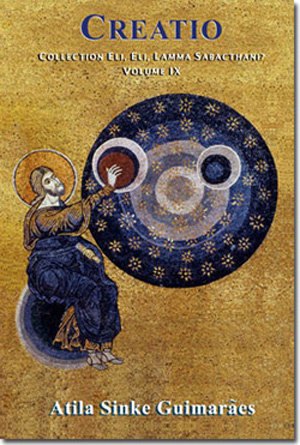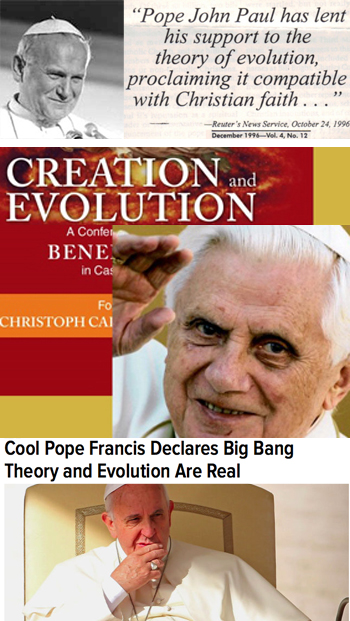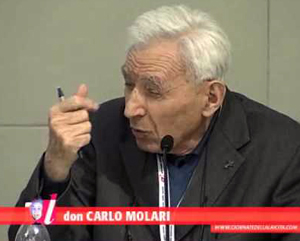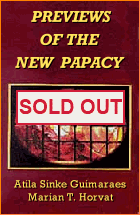Book Reviews
 |
 |
 |
 |
 |
 |
 |
The False Scientific Character of Evolutionism
Book-review of Creatio (Creation) by Atila Sinke Guimarães, Volume 9 of the Collection Eli, Eli, Lamma Sabacthani?, Los Angeles: TIA, 2016, 272 pp.

Purchase here
For several decades prior to Vatican Council II, this group, whose members Guimarães labels progressivists, has been growing in number and influence. They seek to alter, and hence destroy, the traditional Catholic Faith by leading the Church to accord with the new thinking that man is now so sophisticated and learned he can set his own moral standards and define what is “right” and “wrong.” This aim coincided with rapid advances in the physical and biological sciences, as well as in technology, which were also changing the social and moral life of man, thus giving a greater sense of legitimacy to the group’s efforts.
At the Council, progressivists seized control of many of the Council deliberations and, thus, succeeded in imposing their desired changes on the traditional Catholic Faith. Pope Paul VI, in his speech closing the Council, made it very clear that indeed the Council had altered the purpose of the Church by declaring the Church would now be devoted to the “Cult of Man” and labeling the Church the “Conciliar Church.”
In his speech the Pope said: “Do you at least recognize its merit, you modern humanists who have no place for the transcendence of things supreme and come to know our new humanism: We also, more than anyone else, have the cult of man.” (1)
Creatio is an examination of the “Council’s Thinking” regarding Evolutionism and Historicism under the guidance of progressivist periti and hierarchy. Regarding Evolutionism, the Author shows that the rationale for imposing the aforementioned changes derives from the progressivist’s false belief that modern science accepts the legitimacy of biological evolution.

Based on Vatican II the conciliar Popes opened the doors to Evolutionism
Guimarães covers several aspects of the issue of the truth or falsity of biological evolution, even going so far as to describe the affinities of evolution with Marxism as alleged by socialists. In order to support their desired changes in doctrine, the progressivists make the bold implication that just as there is evolution in the physical and biological world, there is evolution in theology, philosophy and even history, implying that old and permanent truths are to be looked at in new ways.
Of course, both the implication and its basis are without foundation.
Guimarães also points out, the progressivists use the great power of obfuscation to impose their desired changes on the tenets of the traditional Catholic Faith. A primary technique in the use of obfuscation is the introduction of terminology permitting many different interpretations. In the Gospel Jesus implicitly warned of such obfuscation when He said: “At that time, Jesus answered and said: I confess to thee, O Father, Lord of heaven and earth, because thou hast hid these things from the wise and prudent and hast revealed them to little ones.” (Mt 12:25)
The Author also discusses Historicism which, as defined by Pope Pius XII, “indicates a philosophical system that, in the whole spiritual reality, the knowledge of truth, morals and the law, recognizes nothing except mutation and evolution. Consequently it rejects everything that is permanent, eternally valid and absolute.” (Creatio, pp. 64, 65) Thus, Historicism obviously rejects the traditional teachings of the Catholic Faith. The progressivists’ alleged validity of Historicism follows from their false claim that “scientific evidence has validated the existence of the evolution of biological species”.
Karl Rahner, a leading progressivist perito at the Council, said: “There is also an evolution and history of doctrine that cannot be explained as just acquiring new additional knowledge, since it conceives old and ‘permanent’ truths in a new way ... In Catholic Theology there is a new Christological re-thinking that is clearly necessary and must work with modern concepts.” (p. 142)
Pierre Teilhard de Chardin, one of the first theologian to promote a “revamping” of the traditional Catholic Faith, clearly asserts such revamping constitutes a new religion. De Chardin asserted: “What does such a hope-filled faith in some coming consummation represent, in the more authentic and psychological sense of the word, except a ‘religion’?
“A religion of Evolution: behold, finally what man increasingly needs to survive and continue forward from the moment he becomes aware of his power and his duty to go beyond his self-realization as man.” (p. 143)

Theologian Molari: Evolution is changing the way we must think about basic doctrines
Molari concludes with the assertion: “The development of the human sciences changes the perspectives upon which theological notions such as grace, trial, sin, conversion, etc. were based” (ibid.)
That is to say, these Vatican periti have used evolution to justify a constant change – in man and doctrine – effectively changing basic tenets of the Catholic Faith. It is worth noting that all the Conciliar Popes – including Benedict XVI, a champion of Historicism – have supported these revolutionary changes.
It is characteristic of Progressivism’s proposed changes in the traditional Catholic Faith that this revolutionary new teaching disregards any consideration of the purpose for which God created both man and the Church. By boldly asserting the need for alterations in the traditional Catholic Faith and couching the changes in sophisticated obfuscating terminology, progressivists give the impression their alterations are in accord with the will of God.
Thus, they are able to impose on the Faith alterations that contradict that Faith and, thus, endanger the very purpose for which God had His Son establish the Church. Jesus’ condemnation in the Gospel (Mk. 9:42) of those who alter His teaching also applies to theologians and Prelates – even at the Church’s summit – who mislead the faithful by teachings that contradict the Magisterium even if such teachings are claimed to be derived from the deliberations of Vatican II, a pastoral council.
In summary, Creatio presents a thorough discussion and rebuttal of the arguments used by progressivists to alter the Catholic Faith, particularly those portions of that Faith relating to Creation. The book maintains the high scholarly standard praised by Michael J. Matt, editor of The Remnant, in his review of Animus Delendi I, (Desire to Destroy), the fourth volume by Guimarães in his 11-volume series: Eli. Eli, Lamma Sabactani.
- Apud Abbé de Nantes, The Book of Accusation against Paul VI.

Posted April 4, 2016
______________________
______________________
 Volume I |
 Volume II |
 Volume III |
 Volume IV |
 Volume V |
 Volume VI |
 Volume VII |
 Volume VIII |
 Volume IX |
 Volume XI |
 Special Edition |
 Special Edition |


